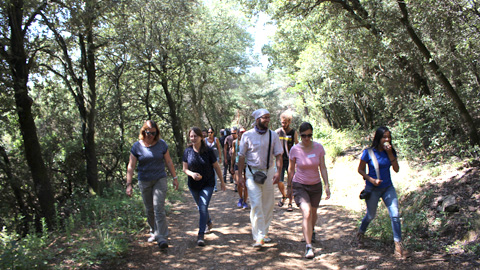Pioneering study analyses the effects of forests on human health

23/07/2018
A group of volunteers participated on Friday 20 July in an experimental study which aimed to analyse the potential health benefits of forests on humans by determining their chemical influence. The research forms part of the "Boscos sans per a una societat saludable" [Healthy Forests for a Healthy Society], organised by the Institute for Environmental Science and Technology of the Universitat Autònoma de Barcelona (ICTA-UAB) and the Centre for Ecological Research and Forestry Applications (CREAF) and funded by the "la Caixa" Foundation with the collaboration of the IrsiCaixa AIDS Research Institute, the Sant Celoni Hospital and Grup Duet.
The project was born out of the growing social and scientific interest in the health benefits of being outdoors, both at physiological, psychological and emotional levels. Despite there being studies indicating possible physiological effects (stronger immune system, improvement in heart rate and blood pressure, reduction of cortisol levels, related with levels of stress, etc.), the evidence is not strong enough to provide a solid basis needed to demonstrate a direct and unique physiochemical effect on the body. This study aims to provide new scientific information which can solve the enigmas of this emerging discipline.
The experimental study, created by ICTA-UAB researchers and funded by the "la Caixa" Foundation, highlights that the therapeutic effects of forests are not limited to the well-being felt when walking, but also include a possible interaction of the chemical components generated by a large part of the vegetation with our health. Among other aspects, these compounds are known to have bactericidal action. The study also investigates the potential effects of the forests' microbiology on humans. IrsiCaixa collaborates in this aspect, by analysing the microbiota of the forests and of the volunteers participating.
The objective was to contribute to the research by delving deeper into the role of forest chemistry and its possible effects on human health. The research will be based on an experimental line.
The experimental part of the research will take place in the Mediterranean forests of holm oaks, cork oaks, pines and in beech tree forests, in areas of the Montseny Natural Park - Biosphere Reserve. Air samples are being taken in these areas and the chemical substances will be analysed and characterised, while the variations in concentrations depending on different variables such as species composition or forest management will also be studied.
Experiment with volunteers in the Montseny
The participatory phase began Friday 20 July in the holm oaks forests of Sant Bernat (Sant Celoni, Montseny), will determine how these substances enter and are metabolised by the human body after a walk through the woods and the effects these can have on the human organism. The trial phase with volunteers will include taking samples with which to analyse the chemistry and microbiology of the forest at that exact moment.
The experiment was conducted with healthy volunteers aged 20 to 40. They were invited to take a walk through the woods and saliva, blood and respiratory tract samples were taken at different moments of the day.